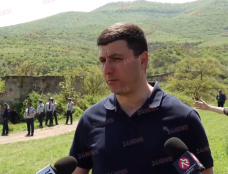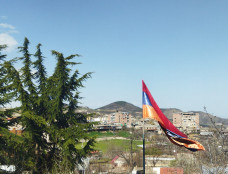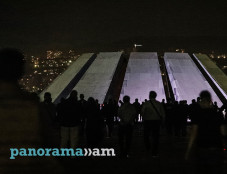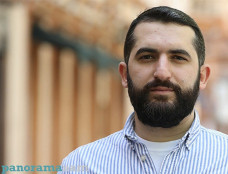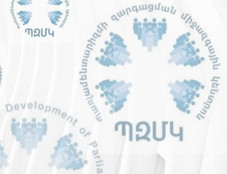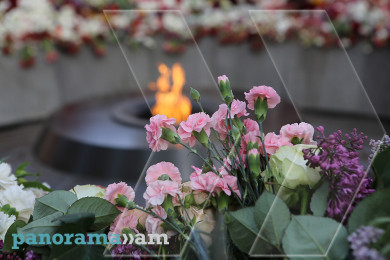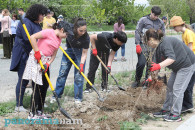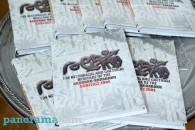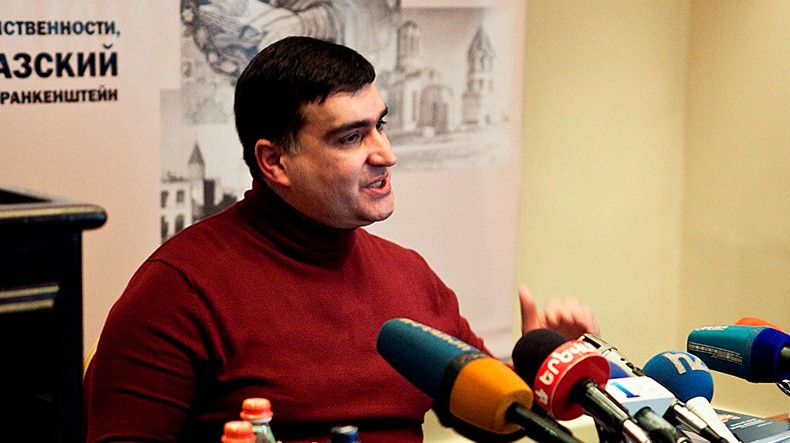
Aris Ghazinyan: Past and future in Azerbaijan are modeled upon decrees and program speeches of president
The capital of the Republic of Armenia, Yerevan, has become a special target of the Azerbaijani information war: since the beginning of 1990s, the official Baku circulates a thesis, which claims that the Armenian capital, as well as the lands, on which it is situated, “originally belong to Azerbaijan.” Armenian journalist and researcher Aris Ghazinyan writes about it in the preface of his book “Yerevan: with a cross or on the cross,” which is an attempt of setting and considering an extremely diverse range of processes directly or indirectly forming the character of the development of the territory in question and predetermining the inevitability of turning Yerevan into the main center of the Eastern Armenia, and later on into the capital of the recovered Armenian state.
For a more detailed acquaintance of the reader with problems, the author demonstrates on specific examples the tastes and the appetite of the Azerbaijani propaganda, which claims the historical heritage of the Armenian nation, citing particularly “the nationwide leader” Heydar Aliyev. According to the latter, “the territory now called Armenia is the Western Azerbaijan: Irevan, Goycha, Zangibasar, and Zangezur mahals were places of inhabitance of Azerbaijani people, Muslims.”
The author also mentions the book “The historical geography of the West Azerbaijan,” published in Baku, with a title reference that the book is published “according to the Decree of the President of the Republic of Azerbaijan Heydar Aliyev of March 26, 1998, on the Genocide of the Azerbaijani People,” in order to “fill the emptiness, which exists in the study of the history and geography of Azerbaijan, and of the historical roots of the Azerbaijani nation.”
The aforementioned policy continued after Heydar Aliyev’s death by his son Ilham Aliyev, who adopted a strategy focused on the demonstration to the international society (as well as to the population of his own country) “the fact that Yerevan belongs to Azerbaijan.”
“In 2004-2006, the Ministry of Justice of Azerbaijan registered a number of social and political organizations, whose activities were directed towards the demonstration to the international society the ‘fair nature’ of the demands about the necessity of the abolition of the Armenian state and the joining of ‘the West Azerbaijan’ to the Azerbaijan Republic,” the author writes, listing the organizations, which were officially registered in that period – “Western Azerbaijan Liberation Front,” “Back to Irevan,” “Irevan Liberation Union,” etc.
In particular, in 2006 Jeyran Ansari, the chairman of “Irevan Liberation Union,” applied to the UN Secretary General, the CoE chairman, and OSCE Minsk Group cochairmen on Karabakh resolution calling them to recognize Yerevan as “an original Azerbaijani city.” President Aliyev also speaks about it in nearly every speech.
However, according to Ghazinyan, considering Yerevan “an integral part of Azerbaijan” is not a new trend processed as “a response to Armenian claims towards Karabakh.” “Pretensions sounded from the very beginning of the declaration of the Azerbaijan Democratic Republic by Turks in 1918 and entered in the context of the Pan-Turkism ideology,” the author explains, noting that those claims “show an enviable succession.”
The nationalistic movements, which exist in many countries of the world and the intellectual wing of which aims at “radical and one-way interpretation of scientific data and their subordination to the main ideological vector,” are as a rule criticized by actual academic circles; they develop in their own way, and very seldom go out of the frames of a separate ideological movement. Nevertheless, the Azerbaijani opinion about history in this context differs from its own “blood brothers” in other countries in that their “fantasies of shadow history are brought to the level of state policy, accompanied by a clear violation of the essentials of scientific accuracy and emphasized by neglecting scientific achievements.”
Azerbaijani historiography adopted all the basic principles of development from the Turkish one, distinctive features of which are still the search and discovery of evidence of the Turkic autochthony in the region, the exaggeration of its own role in the world history, coupled with an demonstrative disregard of the role of other communities; a total turkification of the whole spectrum of the regional heritage (lands, civilizations, ethnic groups, monuments of material and spiritual culture, etc.).
Characterizing the Turkish-Azerbaijani practice of validating their autochthony in the region, the author cites a famous orientalist from the University of London, professor Vladimir Minorsky, according to whom “if there are disputable questions or questions not resolved by the science <…>, the Turks immediately seize the possession of the culture of the Ancient East at one stroke of a pen.”
Both Turkey and Azerbaijan base their fundamental theses on denying the Armenian presence in the region and on the historical arena. “Old Persian manuscripts inform about the rebellion of Aragha, an Armenian, in the 6th century B.C. What do the Panturkists answer to this factual evidence twenty-six centuries after the revolution? He appears ‘not to be an Armenian. The Behistun Inscription refers to one of the rebels in Babylon as Aragha, who was a resident of Arminia-Urashtu. The name is identified with the old Turkic Arag-Arig meaning ‘saint,’ ‘just’,” Ghazinyan writes.
Mocking at the “achievements” of the Pan-Turkic historiography of Turkey and Azerbaijan, the author concludes that it seems quite paradoxical: Armenians do not exist at all, while the limited contingent that identifies itself with Armenians, is in a deep delusion, because it does not know about its “genuinely Turkic origin.”
Therefore, the basic principles of the development of the Turkish historiography on “discovering proofs” of the Turkic autochthony in the region, as well as on the total turkification of the whole spectrum of the regional heritage have sprouted quite successfully on the Azerbaijani “scientific ground.” Citing a number of expressive examples, Ghazinyan concludes that the same can be said about the exaggeration of their own role in the history, which is accompanied by a demonstrative neglecting of the role of other communities.
According to the Azerbaijani historiography, the Romans, by their own acknowledgement, owe the oldest inhabitants of the Apennines, the Turkic peoples, for the appearance of their state, Christian-monotheist thinking, Latin graphics, military science, structure of fleet construction, state system and its attributes, architecture, applied art, geodesy system, gladiatorial games, mythology, and traditions. The logic of the turkification of the Roman heritage is the following: the Etruscans are the descendants of one of the branches of the ancient Sumer civilization <…>, and the scientists come to the idea that the Sumerians, who lived in Mesopotamia in the fourth century B.C., were speaking in the Proto-Turkic language, etc.
According to Ghazinyan, in order to exaggerate their role in the world history, the Azerbaijanis also exploit the thesis that “the Amazons are the ancestors of modern Azerbaijani women,” reasoning it with the statement that “there is no slightest doubt that the initial place of their residence was Gobustan, the Ana Zaga and Yeddi Gozel caves, which are genuine Amazonian caves, and the artifacts found disprove the statements that the Amazons are a myth or Greek women.” Another similar claim is that football and the first Olympic Games are Turkic inventions.
On state and official level, historians in Azerbaijan “discover” a connection between the Upper Paleolithic hunter and a modern Azerbaijani man, this evidenced in the speeches of the top officials of the state, according to whom Azerbaijan, where the life emerged, is the cradle of humankind. They back this by the discovery of azikhantrop in the Azykh cave. According to Heydar Aliyev, possessing all the achievements, gained by the primitive person in the field of culture, the ancestors of the Azerbaijanis created a rich cultural and spiritual heritage, the confirmation of which are the archeological monuments, as well as the extant examples of folklore and written literary heritage.
“Can you imagine the Spanish monarch in the role of a loud-hailer, who broadcasts that the Spanish come from the caves of Cantabria, and that Velazquez and Dali owe their skills to the richest tradition of the Paleolithic paintings of Altamira? Even the sickest imagination cannot picture the French president bringing the nation out from the Lascaux cave, and necessarily pointing to the presence of impressionistic dabs on the petro glyphic paintings of the inhabitants of the famous grotto: the hunters and root collectors,” Ghazinyan writes. He highlights that in case of the Azerbaijani approach to the problem, in Azerbaijan, the past and the future of the region are realized, recovered, and modeled on the basis of decrees, orders, and program speeches of the head of the country.
To be continued.
Aris Ghazinyan’s “Yerevan: with a cross or on the cross” is a book about the social and political history of Yerevan and Yerevan district (as a habitat) since the declaration of Christianity to the beginning of XIX century. In addition to demonstrating historical facts based on archive documents and sources, the book also considers the fundamental theses of the Azerbaijani historiography and Pan-Turkic ideology aimed at appropriating the historical, cultural, and spiritual heritage of the Armenians and other nations of the region by falsifying their history.
Newsfeed
Videos







